Catholic Good News
Receiving the Gospel, Serving God and Neighbor
SPECIAL EDITION:
The Season of Christmas
"The Savior—yes, the Messiah, the Lord—has been born today
in Bethlehem, the city of David!"
Luke 2:11
Receiving the Gospel, Serving God and Neighbor
SPECIAL EDITION:
The Season of Christmas
"The Savior—yes, the Messiah, the Lord—has been born today
in Bethlehem, the city of David!"
Luke 2:11
Dear friends in Christ Jesus,
A very Blessed and Merry Christmas to you as this holy season continues!
Yes, as it begins and continue. [Look below to see what it all entails] The TWELVE DAYS of Christmas begin on Christmas Day, not leading up to it. [The explanations and real meaning of these twelve days are explained further below.] Christmas Day begins the Octave of Christmas, that is, the 8-day expansion of Dec. 25th, where we are to live as it is Christmas Day until the Solemnity of Mary, Mother of God, Jan. 1st. As I like to say, no one knows how to party like the Church. :o)
Finally, FIND BELOW, please enjoy other material gathered for your reading enjoyment and spiritual benefit.
-"The 12 Days of Christmas"
-FOUR WAYS TO HAVE A MORE JOYFUL CHRISTMAS
-POPE BENEDICT SPEAKS ON NATIVITY SCENE AND TREE, SYMBOLS OF CHRIST'S NATIVITY
-excerpts from the Diary of St. Faustina on the Infant Jesus
Blessings for a Christmas Tree and Manger Scene
A bit of humor…
Peace and prayers in Jesus through Mary, loved by Saint Joseph,
Father Robert
P.S. This coming Sunday is the Solemnity of Mary, Mother of God . The readings can be found at: https://bible.usccb.org/bible/readings/123123.cfm
A very Blessed and Merry Christmas to you as this holy season continues!
Yes, as it begins and continue. [Look below to see what it all entails] The TWELVE DAYS of Christmas begin on Christmas Day, not leading up to it. [The explanations and real meaning of these twelve days are explained further below.] Christmas Day begins the Octave of Christmas, that is, the 8-day expansion of Dec. 25th, where we are to live as it is Christmas Day until the Solemnity of Mary, Mother of God, Jan. 1st. As I like to say, no one knows how to party like the Church. :o)
Finally, FIND BELOW, please enjoy other material gathered for your reading enjoyment and spiritual benefit.
-"The 12 Days of Christmas"
-FOUR WAYS TO HAVE A MORE JOYFUL CHRISTMAS
-POPE BENEDICT SPEAKS ON NATIVITY SCENE AND TREE, SYMBOLS OF CHRIST'S NATIVITY
-excerpts from the Diary of St. Faustina on the Infant Jesus
Blessings for a Christmas Tree and Manger Scene
A bit of humor…
Peace and prayers in Jesus through Mary, loved by Saint Joseph,
Father Robert
P.S. This coming Sunday is the Solemnity of Mary, Mother of God . The readings can be found at: https://bible.usccb.org/bible/readings/123123.cfm
Term Review
Octave of Christmas ( from Latin, feminine of octavus "eighth")
- an 8-day period of observances expanding Christmas Day(Dec. 25th) into an 8-day celebration; the octave begins on Christmas Day and ends on the Solemnity of the Mary, the Mother of God
Season of Christmas in the Church
SEASON OF CHRISTMAS IN THE CHURCH
Monday, December 25. Solemnity of Christmas
December 26. Feast of St. Stephen
December 27. Feast of St. John
December 28. Feast of Holy Innocents
December 29. Feast of St. Thomas Becket
December 30. Sixth Day in the Octave of Christmas
Sunday, December 31. Feast of the Holy Family
Monday, January 1. OCTAVE DAY Solemnity of Mary, Mother of God
January 2. Memorials of St. Basil the Great and St. Gregory Nazianzen
January 3. Most Holy Name of Jesus
January 4. St. Elizabeth Ann Seton
January 5. Feast of St. John Neuman
January 6. Optional Memorial of Blessed Andre Bessette
Sunday, January 7. Solemnity of Ephiphay
Monday, January 8. Solemnity of the Baptism of the Lord
[Christmas ends and Ordinary Time begins on Tuesday, January
9th.]Explore the Season of Christmas
http://www.catholicculture.org/culture/liturgicalyear/overviews/seasons/Christmas/
"The 12 Days of Christmas"
~ Origins and Religious Meaning ~
C atholics in England during the period 1558 to 1829 were prohibited by law to practice their faith either in public or private. It was illegal to be Catholic until Parliament finally emancipated Catholics in England in 1829.
"The Twelve Days of Christmas" was written in England as one of the "catechism songs" to help young Catholics learn the basics of their faith. In short, it was a coded-message, a memory aid. Since the song sounded like rhyming nonsense, young Catholics could sing the song without fear of imprisonment. The authorities would not know that it was a religious song.
"The 12 Days of Christmas" is in a sense an allegory. Each of the items in the song represents something significant to the teachings of the Catholic faith. The hidden meaning of each gift was designed to help Catholic children learn their faith. The better acquainted one is with the Bible, the more these interpretations have significance.
T he song goes, "On the first day of Christmas my true love gave to me…"
The "true love" mentioned in the song doesn't refer to an earthly suitor, but it refers to God Himself. The "me" who receives the presents refers to every baptized person. i.e. the Church.
1st Day:
The partridge in a pear tree is Christ Jesus upon the Cross. In the song, Christ is symbolically presented as a mother partridge because she would feign injury to decoy a predator away from her nestlings. She was even willing to die for them.
The tree is the symbol of the fall of the human race through the sin of Adam and Eve. It is also the symbol of its redemption by Jesus Christ on the tree of the Cross.
2nd Day:
The "two turtle doves" refers to the Old and New Testaments.
3rd Day:
The "three French hens" stand for faith, hope and love—the three gifts of the Spirit that abide (1 Corinthians 13).
4th Day:
The "four calling birds" refers to the four evangelists who wrote the Gospels—Matthew, Mark, Luke and John—which sing the song of salvation through Jesus Christ.
5th Day:
The "five golden rings" represents the first five books of the Bible, also called the Jewish Torah: Genesis, Exodus, Leviticus, Numbers and Deuteronomy.
6th Day:
The "six geese a-laying" is the six days of creation.
7th Day:
The "seven swans a-swimming" refers to the seven gifts of the Holy Spirit: wisdom, understanding, counsel, fortitude, knowledge, piety and fear of the Lord.
8th Day:
The "eight maids a milking " reminded children of the eight beatitudes listed in the Sermon on the Mount.
9th Day:
The "nine ladies dancing" were the nine fruits of the Holy Spirit found in Galatians 5:22-23: love, joy, peace, patience, kindness, goodness, faithfulness, gentleness and self control.
10th Day:
The "ten lords a-leaping" represents the Ten Commandments
11th Day:
The "eleven pipers piping" refers to the eleven faithful apostles.
12th Day:
The 'twelve drummers drumming" were the twelve points of belief expressed in the Apostles' Creed: belief in God the Father, the Son and the Holy Spirit, that Jesus Christ was born of the Virgin Mary, made man, crucified, died and arose on the third day, that he sits at the right hand of the father and will come again, the resurrection of the dead and life everlasting.
S o the next time you hear "the Twelve Days of Christmas" consider how this otherwise non-religious sounding song had its origins in keeping alive the teaching of the Catholic faith.
Octave of Christmas ( from Latin, feminine of octavus "eighth")
- an 8-day period of observances expanding Christmas Day(Dec. 25th) into an 8-day celebration; the octave begins on Christmas Day and ends on the Solemnity of the Mary, the Mother of God
Season of Christmas in the Church
SEASON OF CHRISTMAS IN THE CHURCH
Monday, December 25. Solemnity of Christmas
December 26. Feast of St. Stephen
December 27. Feast of St. John
December 28. Feast of Holy Innocents
December 29. Feast of St. Thomas Becket
December 30. Sixth Day in the Octave of Christmas
Sunday, December 31. Feast of the Holy Family
Monday, January 1. OCTAVE DAY Solemnity of Mary, Mother of God
January 2. Memorials of St. Basil the Great and St. Gregory Nazianzen
January 3. Most Holy Name of Jesus
January 4. St. Elizabeth Ann Seton
January 5. Feast of St. John Neuman
January 6. Optional Memorial of Blessed Andre Bessette
Sunday, January 7. Solemnity of Ephiphay
Monday, January 8. Solemnity of the Baptism of the Lord
[Christmas ends and Ordinary Time begins on Tuesday, January
9th.]Explore the Season of Christmas
http://www.catholicculture.org/culture/liturgicalyear/overviews/seasons/Christmas/
"The 12 Days of Christmas"
~ Origins and Religious Meaning ~
C atholics in England during the period 1558 to 1829 were prohibited by law to practice their faith either in public or private. It was illegal to be Catholic until Parliament finally emancipated Catholics in England in 1829.
"The Twelve Days of Christmas" was written in England as one of the "catechism songs" to help young Catholics learn the basics of their faith. In short, it was a coded-message, a memory aid. Since the song sounded like rhyming nonsense, young Catholics could sing the song without fear of imprisonment. The authorities would not know that it was a religious song.
"The 12 Days of Christmas" is in a sense an allegory. Each of the items in the song represents something significant to the teachings of the Catholic faith. The hidden meaning of each gift was designed to help Catholic children learn their faith. The better acquainted one is with the Bible, the more these interpretations have significance.
T he song goes, "On the first day of Christmas my true love gave to me…"
The "true love" mentioned in the song doesn't refer to an earthly suitor, but it refers to God Himself. The "me" who receives the presents refers to every baptized person. i.e. the Church.
1st Day:
The partridge in a pear tree is Christ Jesus upon the Cross. In the song, Christ is symbolically presented as a mother partridge because she would feign injury to decoy a predator away from her nestlings. She was even willing to die for them.
The tree is the symbol of the fall of the human race through the sin of Adam and Eve. It is also the symbol of its redemption by Jesus Christ on the tree of the Cross.
2nd Day:
The "two turtle doves" refers to the Old and New Testaments.
3rd Day:
The "three French hens" stand for faith, hope and love—the three gifts of the Spirit that abide (1 Corinthians 13).
4th Day:
The "four calling birds" refers to the four evangelists who wrote the Gospels—Matthew, Mark, Luke and John—which sing the song of salvation through Jesus Christ.
5th Day:
The "five golden rings" represents the first five books of the Bible, also called the Jewish Torah: Genesis, Exodus, Leviticus, Numbers and Deuteronomy.
6th Day:
The "six geese a-laying" is the six days of creation.
7th Day:
The "seven swans a-swimming" refers to the seven gifts of the Holy Spirit: wisdom, understanding, counsel, fortitude, knowledge, piety and fear of the Lord.
8th Day:
The "eight maids a milking " reminded children of the eight beatitudes listed in the Sermon on the Mount.
9th Day:
The "nine ladies dancing" were the nine fruits of the Holy Spirit found in Galatians 5:22-23: love, joy, peace, patience, kindness, goodness, faithfulness, gentleness and self control.
10th Day:
The "ten lords a-leaping" represents the Ten Commandments
11th Day:
The "eleven pipers piping" refers to the eleven faithful apostles.
12th Day:
The 'twelve drummers drumming" were the twelve points of belief expressed in the Apostles' Creed: belief in God the Father, the Son and the Holy Spirit, that Jesus Christ was born of the Virgin Mary, made man, crucified, died and arose on the third day, that he sits at the right hand of the father and will come again, the resurrection of the dead and life everlasting.
S o the next time you hear "the Twelve Days of Christmas" consider how this otherwise non-religious sounding song had its origins in keeping alive the teaching of the Catholic faith.
FOUR WAYS TO HAVE A MORE JOYFUL CHRISTMAS
1. STOP, LOOK, AND LISTEN:
If you discover yourself becoming dulled to the joys of the season, STOP! Slow the pace down and become still, taking time to LOOK and LISTEN. Take a winter walk, curl up in a favorite chair or before the fireplace. Helen Keller once observed, "The seeing see little." So feel the comfort of the glow of a candle, or the red of the poinsettias. Listen with new ears to laughter and bells, and to the expression of love found in the story of the first Christmas. LOOK UPON THE MANGER, the second home of Love after the womb of His Virgin Mother.
2. BE WILLING TO BE SURPRISED:
Remember that God can come in the least likely ways - a Holy Child born in a village stable, a brightly shining star, an angel song in the night sky. Watch for Him to come in equally surprising ways to you, too. When we live as if God is going to "surprise" us at any moment, in any way, in any place, then He usually does!
3. FREE YOUR CHILDLIKE SPIRIT:
Jesus held up child-likeness as a quality to be cultivated (Mark 10:15 ). Children are experts at dreaming up simple things as delights that adults don't, or have forgotten how to do. Can't you picture a little boy singing "Jingle Bells" to a plastic Jesus in a store? Christmas often comes in precious moments like this, when we spontaneously show our adoration for the Baby in the manger.
4. SHARE THE SPIRIT OF CHRISTMAS WITH SOMEONE ELSE:
Nothing multiplies the sense of wonder in your life like giving it away. The more you share (not just things, but yourself) the brighter Christmas grows.
I hope that these simple steps will help you, or someone you can share these with, keep the wonder and excitement of Christmas alive during this blessed season.
"Jesus is the reason for the season."
+++++++++++++++++++++++++++++++++++++++++++++++++++++++++++++++++++++++++++++++++++++++++
"As He was physically formed in her, so He wills to be spiritually formed in you. If you knew He was seeing through your eyes, you would see in every fellowman a child of God. If you knew that He worked through your hands, they would bless all the day through. If you knew He spoke through your lips, then your speech, like Peter's, would betray that you had been with the Galilean. If you knew that He wants to use your mind, your will, your fingers, and your heart, how different you would be. If half the world did this there would be no war!"
(Archbishop Fulton J. Sheen)
+++++++++++++++++++++++++++++++++++++++++++++++++++++++++++++++++++++++++++++++++++++++++
POPE EMERITUS BENEDICT SPEAKS ON NATIVITY SCENE AND TREE, SYMBOLS OF CHRIST'S NATIVITY
VATICAN CITY, (VIS) - "This ancient fir," said the Pope Emeritus, "cut down without harming the life of the forest, ... will remain standing by the nativity scene until the end of the Christmas festivities. ... It is an important symbol of Christ's Nativity because with its evergreen leaves it recalls the life that does not die. The fir is also a symbol of the popular religiosity in your valleys, which finds particular expression in processions."
"The tree and the nativity scene are elements of that typical Christmas atmosphere which is part of the spiritual heritage of our communities; an atmosphere suffused with religiosity and family intimacy which we must conserve even in our modern societies where the race to consumerism and the search for material goods sometimes seem to prevail.
"Christmas is a Christian feast," added Benedict XVI in conclusion, "and its symbols, especially the nativity scene and the tree hung with gifts, are important references to the great mystery of the Incarnation and the Birth of Jesus, which are constantly evoked by the liturgy of Advent and Christmas."
AC/CHRISTMAS TREE/... VIS 071214 (240)
1. STOP, LOOK, AND LISTEN:
If you discover yourself becoming dulled to the joys of the season, STOP! Slow the pace down and become still, taking time to LOOK and LISTEN. Take a winter walk, curl up in a favorite chair or before the fireplace. Helen Keller once observed, "The seeing see little." So feel the comfort of the glow of a candle, or the red of the poinsettias. Listen with new ears to laughter and bells, and to the expression of love found in the story of the first Christmas. LOOK UPON THE MANGER, the second home of Love after the womb of His Virgin Mother.
2. BE WILLING TO BE SURPRISED:
Remember that God can come in the least likely ways - a Holy Child born in a village stable, a brightly shining star, an angel song in the night sky. Watch for Him to come in equally surprising ways to you, too. When we live as if God is going to "surprise" us at any moment, in any way, in any place, then He usually does!
3. FREE YOUR CHILDLIKE SPIRIT:
Jesus held up child-likeness as a quality to be cultivated (Mark 10:15 ). Children are experts at dreaming up simple things as delights that adults don't, or have forgotten how to do. Can't you picture a little boy singing "Jingle Bells" to a plastic Jesus in a store? Christmas often comes in precious moments like this, when we spontaneously show our adoration for the Baby in the manger.
4. SHARE THE SPIRIT OF CHRISTMAS WITH SOMEONE ELSE:
Nothing multiplies the sense of wonder in your life like giving it away. The more you share (not just things, but yourself) the brighter Christmas grows.
I hope that these simple steps will help you, or someone you can share these with, keep the wonder and excitement of Christmas alive during this blessed season.
"Jesus is the reason for the season."
+++++++++++++++++++++++++++++++++++++++++++++++++++++++++++++++++++++++++++++++++++++++++
"As He was physically formed in her, so He wills to be spiritually formed in you. If you knew He was seeing through your eyes, you would see in every fellowman a child of God. If you knew that He worked through your hands, they would bless all the day through. If you knew He spoke through your lips, then your speech, like Peter's, would betray that you had been with the Galilean. If you knew that He wants to use your mind, your will, your fingers, and your heart, how different you would be. If half the world did this there would be no war!"
(Archbishop Fulton J. Sheen)
+++++++++++++++++++++++++++++++++++++++++++++++++++++++++++++++++++++++++++++++++++++++++
POPE EMERITUS BENEDICT SPEAKS ON NATIVITY SCENE AND TREE, SYMBOLS OF CHRIST'S NATIVITY
VATICAN CITY, (VIS) - "This ancient fir," said the Pope Emeritus, "cut down without harming the life of the forest, ... will remain standing by the nativity scene until the end of the Christmas festivities. ... It is an important symbol of Christ's Nativity because with its evergreen leaves it recalls the life that does not die. The fir is also a symbol of the popular religiosity in your valleys, which finds particular expression in processions."
"The tree and the nativity scene are elements of that typical Christmas atmosphere which is part of the spiritual heritage of our communities; an atmosphere suffused with religiosity and family intimacy which we must conserve even in our modern societies where the race to consumerism and the search for material goods sometimes seem to prevail.
"Christmas is a Christian feast," added Benedict XVI in conclusion, "and its symbols, especially the nativity scene and the tree hung with gifts, are important references to the great mystery of the Incarnation and the Birth of Jesus, which are constantly evoked by the liturgy of Advent and Christmas."
AC/CHRISTMAS TREE/... VIS 071214 (240)
Greccio is the mountain village where Saint Francis of Assisi created the first crib scene in 1223 to commemorate the birth of Jesus. Pope Francis returned to the town on Sunday to deliver his Apostolic Letter entitled, “Admirabile signum”.
An enchanting imageThe Latin title of the Letter refers to the “enchanting image” of the Christmas crèche, one that “never ceases to arouse amazement and wonder”, writes the Pope. “The depiction of Jesus’ birth is itself a simple and joyful proclamation of the mystery of the Incarnation of the Son of God”, he says.
A living Gospel“The nativity scene is like a living Gospel rising up from the pages of sacred Scripture”, continues Pope Francis. Contemplating the Christmas story is like setting out on a spiritual journey, “drawn by the humility of the God who became man in order to encounter every man and woman.” So great is His love for us, writes the Pope, “that He became one of us, so that we in turn might become one with Him.”
A family tradition
The Pope hopes this Letter will encourage the family tradition of preparing the nativity scene, “but also the custom of setting it up in the workplace, in schools, hospitals, prisons and town squares.” Praising the imagination and creativity that goes into these small masterpieces, Pope Francis says he hopes this custom will never be lost “and that, wherever it has fallen into disuse, it can be rediscovered and revived.”
The Gospel origin of the crèchePope Francis recalls the origin of the Christmas crèche as related in the Gospels. “Coming into this world, the Son of God was laid in the place where animals feed. Hay became the first bed of the One who would reveal Himself as ‘the bread come down from heaven’.” The nativity scene “evokes a number of the mysteries of Jesus’ life and brings them close to our own daily lives”, writes the Pope.
Saint Francis’ crèche in GreccioPope Francis takes us back to the Italian town of Greccio, which Saint Francis visited in the year 1223. The caves he saw there reminded him of the countryside of Bethlehem. On 25 December, friars and local people came together, bringing flowers and torches, writes the Pope. “When Francis arrived, he found a manger full of hay, an ox and a donkey.” A priest celebrated the Eucharist over the manger, “showing the bond between the Incarnation of the Son of God and the Eucharist.”
The start of the traditionThis is how our tradition began, continues Pope Francis, “with everyone gathered in joy around the cave, with no distance between the original event and those sharing in its mystery.” With the simplicity of that sign, Saint Francis carried out a great work of evangelization, he writes. His teaching continues today “to offer a simple yet authentic means of portraying the beauty of our faith.”
A sign of God’ tender lovePope Francis explains that the Christmas crèche moves us so deeply because it shows God’s tender love. From the time of its Franciscan origins, “the nativity scene has invited us to ‘feel’ and ‘touch’ the poverty that God’s Son took upon Himself in the Incarnation”, writes the Pope. “It asks us to meet Him and serve Him by showing mercy to those of our brothers and sisters in greatest need.”
The meaning of the crèche elements Pope Francis reflects on the meaning behind the elements that make up the nativity scene. He begins with the background of “a starry sky wrapped in the darkness and silence of night.” We think of when we have experienced the darkness of night, he says, yet even then, God does not abandon us. “His closeness brings light where there is darkness and shows the way to those dwelling in the shadow of suffering.”
The landscapeThe Pope then writes about the landscapes that often include ancient ruins or buildings. He explains how these ruins are “the visible sign of fallen humanity, of everything that inevitably falls into ruin, decays and disappoints.” This scenic setting tells us that Jesus has come “to heal and rebuild, to restore the world and our lives to their original splendour.”
The shepherdsTurning to the shepherds, Pope Francis writes that, “unlike so many other people, busy about many things, the shepherds become the first to see the most essential thing of all: the gift of salvation. It is the humble and the poor who greet the event of the Incarnation.” The shepherds respond to God “who comes to meet us in the Infant Jesus by setting out to meet Him with love, gratitude and awe”, he adds.
The poor and the lowlyThe presence of the poor and the lowly, continues the Pope, is a reminder that “God became man for the sake of those who feel most in need of His love and who ask Him to draw near to them.” From the manger, “Jesus proclaims, in a meek yet powerful way, the need for sharing with the poor as the path to a more human and fraternal world in which no one is excluded or marginalized.”
Everyday holinessThen there are the figures that have no apparent connection with the Gospel accounts. Yet, writes Pope Francis, “from the shepherd to the blacksmith, from the baker to the musicians, from the women carrying jugs of water to the children at play: all this speaks of everyday holiness, the joy of doing ordinary things in an extraordinary way.”
Mary and JosephThe Pope then focuses on the figures of Mary and Joseph.
“Mary is a mother who contemplates her child and shows Him to every visitor”, he writes. “In her, we see the Mother of God who does not keep her Son only to herself, but invites everyone to obey His word and to put it into practice. Saint Joseph stands by her side, “protecting the Child and His Mother.” Joseph is the guardian, the just man, who “entrusted himself always to God’s will.”
The Infant JesusBut it is when we place the statue of the Infant Jesus in the manger, that the nativity scene comes alive, says Pope Francis. “It seems impossible, yet it is true: in Jesus, God was a child, and in this way He wished to reveal the greatness of His love: by smiling and opening His arms to all.” The crèche allows us to see and touch this unique and unparalleled event that changed the course of history, “but it also makes us reflect on how our life is part of God’s own life.”
The Three KingsAs the Feast of Epiphany approaches, we add the Three Kings to the Christmas crèche. Their presence reminds us of every Christian’s responsibility to spread the Gospel, writes Pope Francis. “The Magi teach us that people can come to Christ by a very long route”, but returning home, they tell others of this amazing encounter with the Messiah, “thus initiating the spread of the Gospel among the nations.”
Transmitting the faithThe memories of standing before the Christmas crèche when we were children should remind us “of our duty to share this same experience with our children and our grandchildren”, says Pope Francis. It does not matter how the nativity scene is arranged, “what matters is that it speaks to our lives.”
The Christmas crèche is part of the precious yet demanding process of passing on the faith, concludes Pope Francis. “Beginning in childhood, and at every stage of our lives, it teaches us to contemplate Jesus, to experience God’s love for us, to feel and believe that God is with us and that we are with Him.”
This is a series of excerpts from the Diary of St. Faustina on the Infant Jesus and the Holy Eucharist:
After Holy Communion: "I suddenly saw the Infant Jesus standing by my kneeler and holding on to it with His two little hands. Although He was but a little Child, my soul was filled with awe and fear, for I see in Him my Judge, my Lord, and my Creator, before whose holiness the Angels tremble. At the same time, my soul was flooded with such unspeakable love that I thought I would die under its influence" (Divine Mercy in My Soul, 566).
During Mass, "I saw the Infant Jesus near my kneeler. He appeared to be about one year old, and He asked me to take Him in my arms. When I did take Him in my arms, He cuddled up close to my bosom and said, 'It is good for Me to be close to your heart . . . . Because I want to teach you spiritual childhood. I want you to be very little, because when you are little, I carry you close to My Heart, just as you are holding Me close to your heart right now" (1481).
"I saw the Infant Jesus who, with hands outstretched toward us, was sitting in the chalice being used at Holy Mass. After gazing at me penetratingly, He spoke these words: 'As you see Me in this chalice, so I dwell in your heart" (1346).
"When Mass began, a strange silence and joy filled my heart. Just then, I saw Our Lady with the Infant Jesus . . . . The most holy Mother said to me, 'Take my Dearest Treasure,' and she handed me the Infant Jesus. When I took the Infant Jesus in my arms, the Mother of God and Saint Joseph disappeared. I was left alone with the Infant Jesus" (608).
"When I arrived at Midnight Mass, from the very beginning I steeped myself in deep recollection, during which time I saw the stable of Bethlehem filled with great radiance. The Blessed Virgin, all lost in the deepest of love, was wrapping Jesus in swaddling clothes, but Saint Joseph was still asleep. Only after the Mother of God put Jesus in the manger did the light of God awaken Joseph, who also prayed. But after awhile I was left alone with the Infant Jesus who stretched out His little hands to me, and I understood that I was to take Him in my arms. Jesus pressed His head against my heart and gave me to know, by His profound gaze, how good He found it to be next to my heart" (1442).
An enchanting imageThe Latin title of the Letter refers to the “enchanting image” of the Christmas crèche, one that “never ceases to arouse amazement and wonder”, writes the Pope. “The depiction of Jesus’ birth is itself a simple and joyful proclamation of the mystery of the Incarnation of the Son of God”, he says.
A living Gospel“The nativity scene is like a living Gospel rising up from the pages of sacred Scripture”, continues Pope Francis. Contemplating the Christmas story is like setting out on a spiritual journey, “drawn by the humility of the God who became man in order to encounter every man and woman.” So great is His love for us, writes the Pope, “that He became one of us, so that we in turn might become one with Him.”
A family tradition
The Pope hopes this Letter will encourage the family tradition of preparing the nativity scene, “but also the custom of setting it up in the workplace, in schools, hospitals, prisons and town squares.” Praising the imagination and creativity that goes into these small masterpieces, Pope Francis says he hopes this custom will never be lost “and that, wherever it has fallen into disuse, it can be rediscovered and revived.”
The Gospel origin of the crèchePope Francis recalls the origin of the Christmas crèche as related in the Gospels. “Coming into this world, the Son of God was laid in the place where animals feed. Hay became the first bed of the One who would reveal Himself as ‘the bread come down from heaven’.” The nativity scene “evokes a number of the mysteries of Jesus’ life and brings them close to our own daily lives”, writes the Pope.
Saint Francis’ crèche in GreccioPope Francis takes us back to the Italian town of Greccio, which Saint Francis visited in the year 1223. The caves he saw there reminded him of the countryside of Bethlehem. On 25 December, friars and local people came together, bringing flowers and torches, writes the Pope. “When Francis arrived, he found a manger full of hay, an ox and a donkey.” A priest celebrated the Eucharist over the manger, “showing the bond between the Incarnation of the Son of God and the Eucharist.”
The start of the traditionThis is how our tradition began, continues Pope Francis, “with everyone gathered in joy around the cave, with no distance between the original event and those sharing in its mystery.” With the simplicity of that sign, Saint Francis carried out a great work of evangelization, he writes. His teaching continues today “to offer a simple yet authentic means of portraying the beauty of our faith.”
A sign of God’ tender lovePope Francis explains that the Christmas crèche moves us so deeply because it shows God’s tender love. From the time of its Franciscan origins, “the nativity scene has invited us to ‘feel’ and ‘touch’ the poverty that God’s Son took upon Himself in the Incarnation”, writes the Pope. “It asks us to meet Him and serve Him by showing mercy to those of our brothers and sisters in greatest need.”
The meaning of the crèche elements Pope Francis reflects on the meaning behind the elements that make up the nativity scene. He begins with the background of “a starry sky wrapped in the darkness and silence of night.” We think of when we have experienced the darkness of night, he says, yet even then, God does not abandon us. “His closeness brings light where there is darkness and shows the way to those dwelling in the shadow of suffering.”
The landscapeThe Pope then writes about the landscapes that often include ancient ruins or buildings. He explains how these ruins are “the visible sign of fallen humanity, of everything that inevitably falls into ruin, decays and disappoints.” This scenic setting tells us that Jesus has come “to heal and rebuild, to restore the world and our lives to their original splendour.”
The shepherdsTurning to the shepherds, Pope Francis writes that, “unlike so many other people, busy about many things, the shepherds become the first to see the most essential thing of all: the gift of salvation. It is the humble and the poor who greet the event of the Incarnation.” The shepherds respond to God “who comes to meet us in the Infant Jesus by setting out to meet Him with love, gratitude and awe”, he adds.
The poor and the lowlyThe presence of the poor and the lowly, continues the Pope, is a reminder that “God became man for the sake of those who feel most in need of His love and who ask Him to draw near to them.” From the manger, “Jesus proclaims, in a meek yet powerful way, the need for sharing with the poor as the path to a more human and fraternal world in which no one is excluded or marginalized.”
Everyday holinessThen there are the figures that have no apparent connection with the Gospel accounts. Yet, writes Pope Francis, “from the shepherd to the blacksmith, from the baker to the musicians, from the women carrying jugs of water to the children at play: all this speaks of everyday holiness, the joy of doing ordinary things in an extraordinary way.”
Mary and JosephThe Pope then focuses on the figures of Mary and Joseph.
“Mary is a mother who contemplates her child and shows Him to every visitor”, he writes. “In her, we see the Mother of God who does not keep her Son only to herself, but invites everyone to obey His word and to put it into practice. Saint Joseph stands by her side, “protecting the Child and His Mother.” Joseph is the guardian, the just man, who “entrusted himself always to God’s will.”
The Infant JesusBut it is when we place the statue of the Infant Jesus in the manger, that the nativity scene comes alive, says Pope Francis. “It seems impossible, yet it is true: in Jesus, God was a child, and in this way He wished to reveal the greatness of His love: by smiling and opening His arms to all.” The crèche allows us to see and touch this unique and unparalleled event that changed the course of history, “but it also makes us reflect on how our life is part of God’s own life.”
The Three KingsAs the Feast of Epiphany approaches, we add the Three Kings to the Christmas crèche. Their presence reminds us of every Christian’s responsibility to spread the Gospel, writes Pope Francis. “The Magi teach us that people can come to Christ by a very long route”, but returning home, they tell others of this amazing encounter with the Messiah, “thus initiating the spread of the Gospel among the nations.”
Transmitting the faithThe memories of standing before the Christmas crèche when we were children should remind us “of our duty to share this same experience with our children and our grandchildren”, says Pope Francis. It does not matter how the nativity scene is arranged, “what matters is that it speaks to our lives.”
The Christmas crèche is part of the precious yet demanding process of passing on the faith, concludes Pope Francis. “Beginning in childhood, and at every stage of our lives, it teaches us to contemplate Jesus, to experience God’s love for us, to feel and believe that God is with us and that we are with Him.”
This is a series of excerpts from the Diary of St. Faustina on the Infant Jesus and the Holy Eucharist:
After Holy Communion: "I suddenly saw the Infant Jesus standing by my kneeler and holding on to it with His two little hands. Although He was but a little Child, my soul was filled with awe and fear, for I see in Him my Judge, my Lord, and my Creator, before whose holiness the Angels tremble. At the same time, my soul was flooded with such unspeakable love that I thought I would die under its influence" (Divine Mercy in My Soul, 566).
During Mass, "I saw the Infant Jesus near my kneeler. He appeared to be about one year old, and He asked me to take Him in my arms. When I did take Him in my arms, He cuddled up close to my bosom and said, 'It is good for Me to be close to your heart . . . . Because I want to teach you spiritual childhood. I want you to be very little, because when you are little, I carry you close to My Heart, just as you are holding Me close to your heart right now" (1481).
"I saw the Infant Jesus who, with hands outstretched toward us, was sitting in the chalice being used at Holy Mass. After gazing at me penetratingly, He spoke these words: 'As you see Me in this chalice, so I dwell in your heart" (1346).
"When Mass began, a strange silence and joy filled my heart. Just then, I saw Our Lady with the Infant Jesus . . . . The most holy Mother said to me, 'Take my Dearest Treasure,' and she handed me the Infant Jesus. When I took the Infant Jesus in my arms, the Mother of God and Saint Joseph disappeared. I was left alone with the Infant Jesus" (608).
"When I arrived at Midnight Mass, from the very beginning I steeped myself in deep recollection, during which time I saw the stable of Bethlehem filled with great radiance. The Blessed Virgin, all lost in the deepest of love, was wrapping Jesus in swaddling clothes, but Saint Joseph was still asleep. Only after the Mother of God put Jesus in the manger did the light of God awaken Joseph, who also prayed. But after awhile I was left alone with the Infant Jesus who stretched out His little hands to me, and I understood that I was to take Him in my arms. Jesus pressed His head against my heart and gave me to know, by His profound gaze, how good He found it to be next to my heart" (1442).
BLESSING OF A CHRISTMAS TREE
A popular custom is to bless the Christmas tree before lighting. This can be done on Christmas Eve. It is good to remind our children and ourselves of the part a tree played in the sins of our first parents and of the sacred wood of the Tree (the Cross) on which Jesus Christ, whose birthday we are about to celebrate, wrought our redemption.
The origin of the Christmas tree goes back to the medieval German mystery plays. One of the most popular 'mysteries' was the Paradise play, representing the creation of man, the sin of Adam and Eve and their expulsion from Paradise. It usually closed with the consoling promise of the coming Savior and with a reference to His incarnation. This made the Paradise play a favorite pageant for Advent, and its closing scenes used to lead directly into the story of Bethlehem.
These plays were performed either in the open, or the large squares in front of churches, or inside the house of God. The garden of Eden was indicated by a fir tree hung with apples; it represented both the 'Tree of Life' and the 'Tree of discernment of good and evil' which stood in the center of Paradise.
After the suppression of the mystery plays in churches, the Paradise tree, the only symbolic object of the play, found its way into the homes of the faithful, especially since many plays had interpreted it as a symbol of the coming Savior. Following this symbolism, in the fifteenth century the custom developed of decorating the Paradise tree, already bearing apples, with small white wafers representing the Holy Eucharist; thus, in legendary usage, the tree which had borne the fruit of sin for Adam and Eve, now bore the saving fruit of the Sacrament, symbolized by the wafers. These wafers were later replaced by little pieces of pastry cut in the shape of stars, angels, hearts, flowers, and bells.
In some homes the tree is blessed on Christmas eve and the crib on Christmas morning. The following form may be used for the Blessing of the Christmas Tree:
When the tree has been prepared, the household gathers around it. All make the sign of the cross.
The father or leader begins:
Blessed be the name of the Lord.
All respond:
Now and for ever.
The leader may use these or similar words to introduce the blessing:
This tree is a blessing to our home. It reminds us of all that is beautiful, all that is filled with the gentleness and the promise of God. It stands in our midst as a tree of light that we might promise such beauty to one another and to our world. It stands like that tree of paradise that God made into the tree of life, the cross of Jesus.
FIRST READING :
The mother of the family reads:
God said: Let the earth bring forth vegetation: seed-bearing plants and all kinds of fruit trees that bear fruit containing their seed. And so it was. The earth brought forth vegetation, every kind of seed-bearing plant and all kinds of trees that bear fruit containing their seed. The Lord God made to grow out of the ground all kinds of trees pleasant to the sight and good for food, the tree of life also in the midst of the garden, and the tree of the knowledge of good and evil. And God saw that it was good. (Genesis 1:10-13)
The reader concludes:
The Word of the Lord.
All respond:
Thanks be to God.
(The family's Bible may be used for an alternate reading such as Psalm 96:11-13.)
SECOND READING :
One of the children reads:
From the Holy Gospel according to St. Luke:
At that time it came to pass that while Mary and Joseph were at Bethlehem, the days for her to be delivered were fulfilled. And she brought forth her first-born son, and wrapped him in swaddling clothes and laid him in a manger, because there was no room for them in the inn. And there were shepherds in the same district living in the fields and keeping watch over their flock by night. And behold, an angel of the Lord stood by them and the glory of God shone about them and they feared exceedingly. And the angel said to them, "Do not be afraid, for behold, I bring you news of great joy which shall be to all the people: for there has been born to you today in the town of David a Savior, who is Christ the Lord. And suddenly there was with the angel a multitude of the heavenly host praising God and saying:
All recite:
Glory to God on high, * and on earth peace to men whom God has chosen. * We praise you. * We bless you. * We adore you. * We glorify you. * We worship you for your great glory. * Lord God, heavenly king, * God the Father all-powerful! * Lord Jesus Christ, only-begotten Son! * Lord God, Lamb of God, Son of the Father! * You that take away the sins of the world, * have mercy on us. * You that take away the sins of the world, * receive our prayer. * You that sit at the right hand of the Father, * have mercy on us. * For you alone are the Holy One, * you alone are the Lord. * You alone are the Most High, O Jesus Christ, * with the Holy Spirit in the glory of God the Father. * Amen.
After a time of silence, all join in prayers of intercession and in the Lord's Prayer (the Our Father).
Then the father or leader invites:
Let us now pray for God's blessing upon this tree and all who gather around this tree.
After a short silence, the father or leader prays:
Lord our God, we praise you for the light of creation: the sun, the moon, and the stars of the night. We praise you for the light of Israel: the Law, the prophets, and the wisdom of the Scriptures.
We praise you for Jesus Christ, your Son: he is Emmanuel, God-with-us, the Prince of Peace, who fills us with the wonder of your love.
God of all creation, we praise you for this tree which brings beauty and memories and the promise of life to our home. May the light and cheer it gives be a sign of the joy that fills our hearts. May all who delight in this tree come to the knowledge and joy of salvation.
Father, bless this noble tree which we have adorned in honor of the new birth of Your only-begotten Son, and also adorn our souls with the manifold beauties of Your graces that being internally enlightened by the splendor radiating from this tree, we like the Magi may come to adore Him who is eternal Light and Beauty, the same Jesus Christ, Your Son, our Lord.
R. Amen.
The lights of the tree are then illuminated. And then the tree is blessed with Holy Water.
The leader says:
Let us bless the Lord.
All respond, making the sign of the cross:
Thanks be to God.
Another child concludes:
After the fall of our first parents the earth was bare and desolate; the world stood in the darkness of sin. But when the Savior was born our earth shone with a new brightness; the glory of the Almighty had renewed the world, making it more beautiful than before. This tree once stood dark and empty in a cold world. But now resplendent with lights and bright adornments in its new glory, this Christmas tree reflects the new beauty that God brought to earth when "the Word was made flesh and dwelt among us." By a tree the whole world has been redeemed, and therefore, with great joy we celebrate the glory of this tree.
The blessing concludes with a verse from
"O come, O Come, Emmanuel":
O come, thou dayspring, come and cheer
Our spirits by thine advent here;
Disperse the gloomy clouds of night
And death's dark shadow put to flight.
Rejoice! Rejoice! Emmanuel
Shall come to thee, O Israel.
The origin of the Christmas tree goes back to the medieval German mystery plays. One of the most popular 'mysteries' was the Paradise play, representing the creation of man, the sin of Adam and Eve and their expulsion from Paradise. It usually closed with the consoling promise of the coming Savior and with a reference to His incarnation. This made the Paradise play a favorite pageant for Advent, and its closing scenes used to lead directly into the story of Bethlehem.
These plays were performed either in the open, or the large squares in front of churches, or inside the house of God. The garden of Eden was indicated by a fir tree hung with apples; it represented both the 'Tree of Life' and the 'Tree of discernment of good and evil' which stood in the center of Paradise.
After the suppression of the mystery plays in churches, the Paradise tree, the only symbolic object of the play, found its way into the homes of the faithful, especially since many plays had interpreted it as a symbol of the coming Savior. Following this symbolism, in the fifteenth century the custom developed of decorating the Paradise tree, already bearing apples, with small white wafers representing the Holy Eucharist; thus, in legendary usage, the tree which had borne the fruit of sin for Adam and Eve, now bore the saving fruit of the Sacrament, symbolized by the wafers. These wafers were later replaced by little pieces of pastry cut in the shape of stars, angels, hearts, flowers, and bells.
In some homes the tree is blessed on Christmas eve and the crib on Christmas morning. The following form may be used for the Blessing of the Christmas Tree:
When the tree has been prepared, the household gathers around it. All make the sign of the cross.
The father or leader begins:
Blessed be the name of the Lord.
All respond:
Now and for ever.
The leader may use these or similar words to introduce the blessing:
This tree is a blessing to our home. It reminds us of all that is beautiful, all that is filled with the gentleness and the promise of God. It stands in our midst as a tree of light that we might promise such beauty to one another and to our world. It stands like that tree of paradise that God made into the tree of life, the cross of Jesus.
FIRST READING :
The mother of the family reads:
God said: Let the earth bring forth vegetation: seed-bearing plants and all kinds of fruit trees that bear fruit containing their seed. And so it was. The earth brought forth vegetation, every kind of seed-bearing plant and all kinds of trees that bear fruit containing their seed. The Lord God made to grow out of the ground all kinds of trees pleasant to the sight and good for food, the tree of life also in the midst of the garden, and the tree of the knowledge of good and evil. And God saw that it was good. (Genesis 1:10-13)
The reader concludes:
The Word of the Lord.
All respond:
Thanks be to God.
(The family's Bible may be used for an alternate reading such as Psalm 96:11-13.)
SECOND READING :
One of the children reads:
From the Holy Gospel according to St. Luke:
At that time it came to pass that while Mary and Joseph were at Bethlehem, the days for her to be delivered were fulfilled. And she brought forth her first-born son, and wrapped him in swaddling clothes and laid him in a manger, because there was no room for them in the inn. And there were shepherds in the same district living in the fields and keeping watch over their flock by night. And behold, an angel of the Lord stood by them and the glory of God shone about them and they feared exceedingly. And the angel said to them, "Do not be afraid, for behold, I bring you news of great joy which shall be to all the people: for there has been born to you today in the town of David a Savior, who is Christ the Lord. And suddenly there was with the angel a multitude of the heavenly host praising God and saying:
All recite:
Glory to God on high, * and on earth peace to men whom God has chosen. * We praise you. * We bless you. * We adore you. * We glorify you. * We worship you for your great glory. * Lord God, heavenly king, * God the Father all-powerful! * Lord Jesus Christ, only-begotten Son! * Lord God, Lamb of God, Son of the Father! * You that take away the sins of the world, * have mercy on us. * You that take away the sins of the world, * receive our prayer. * You that sit at the right hand of the Father, * have mercy on us. * For you alone are the Holy One, * you alone are the Lord. * You alone are the Most High, O Jesus Christ, * with the Holy Spirit in the glory of God the Father. * Amen.
After a time of silence, all join in prayers of intercession and in the Lord's Prayer (the Our Father).
Then the father or leader invites:
Let us now pray for God's blessing upon this tree and all who gather around this tree.
After a short silence, the father or leader prays:
Lord our God, we praise you for the light of creation: the sun, the moon, and the stars of the night. We praise you for the light of Israel: the Law, the prophets, and the wisdom of the Scriptures.
We praise you for Jesus Christ, your Son: he is Emmanuel, God-with-us, the Prince of Peace, who fills us with the wonder of your love.
God of all creation, we praise you for this tree which brings beauty and memories and the promise of life to our home. May the light and cheer it gives be a sign of the joy that fills our hearts. May all who delight in this tree come to the knowledge and joy of salvation.
Father, bless this noble tree which we have adorned in honor of the new birth of Your only-begotten Son, and also adorn our souls with the manifold beauties of Your graces that being internally enlightened by the splendor radiating from this tree, we like the Magi may come to adore Him who is eternal Light and Beauty, the same Jesus Christ, Your Son, our Lord.
R. Amen.
The lights of the tree are then illuminated. And then the tree is blessed with Holy Water.
The leader says:
Let us bless the Lord.
All respond, making the sign of the cross:
Thanks be to God.
Another child concludes:
After the fall of our first parents the earth was bare and desolate; the world stood in the darkness of sin. But when the Savior was born our earth shone with a new brightness; the glory of the Almighty had renewed the world, making it more beautiful than before. This tree once stood dark and empty in a cold world. But now resplendent with lights and bright adornments in its new glory, this Christmas tree reflects the new beauty that God brought to earth when "the Word was made flesh and dwelt among us." By a tree the whole world has been redeemed, and therefore, with great joy we celebrate the glory of this tree.
The blessing concludes with a verse from
"O come, O Come, Emmanuel":
O come, thou dayspring, come and cheer
Our spirits by thine advent here;
Disperse the gloomy clouds of night
And death's dark shadow put to flight.
Rejoice! Rejoice! Emmanuel
Shall come to thee, O Israel.
The manger scene has a special place near the Christmas tree or in another place where family members can reflect and pray during the Christmas season. It is blessed each year on Christmas Eve or Christmas Day. It is appropriate to have Holy Water available.
All make the sign of the cross. The leader begins:
Our help is in the name of the Lord.
All respond:
Who made heaven and earth.
The leader may use these or similar words to introduce the blessing.
We are at the beginning of the days of Christmas. All through the season we will look on these images of sheep and cattle, of shepherds, of Mary and of Joseph and Jesus.
Then the Scripture is read by a reader:
Listen to the words of the holy gospel according to Luke:
In those days a decree went out from Caesar Augustus that the whole world should be enrolled. This was the first enrollment, when Quirinius was governor of Syria. So all went to be enrolled, each to his own town. And Joseph too went up from Galilee from the town of Nazareth to Judea , to the city of David that is called Bethlehem, because he was of the house and family of David, to be enrolled with Mary, his betrothed, who was with child. While they were there, the time came for her to have her child, and she gave birth to her firstborn son. She wrapped him in swaddling clothes and laid him in a manger, because there was no room for them in the inn.—Luke 2:1-7
The reader concludes:
This is the Gospel of the Lord.
All respond:
Praise to you, Lord Jesus Christ.
The figures may be placed in the manger. After a time of silence, all join in prayers of intercession and in the Lord's Prayer (the Our Father).
Then the leader invites:
Pray now for God's blessing as we look on these figures.
After a short silence, the leader prays the blessing:
O God of every nation and people,
from the very beginning of creation
you have made manifest your love:
when our need for a Savior was great
you sent your Son to be born of the Virgin Mary.
To our lives he brings joy and peace,
justice, mercy, and love.
Lord,
Bless this manger and all who look upon it.
Through all the days of Christmas
may these figures tell the story
of how humans, angels, and animals
found the Christ in this poor place.
Fill our house with hospitality, joy,
gentleness, and thanksgiving
and guide our steps in the way of peace.
May this manger remind us
of the humble birth of Jesus,
and raise our thoughts to him,
who is God-with-us and Savior of all,
and who lives and reigns for ever and ever.
R. Amen.
(Then sprinkle Holy Water on the Crèche or Manger.)
The leader says:
Let us bless the Lord.
All respond, making the sign of the cross:
And give Him thanks.
Then Christmas songs and carols are sung such as:
It Came Upon the Midnight Clear
It came upon the midnight clear,
That glorious song of old,
From angels bending near the earth,
To touch their harps of gold;
"Peace on the earth, good will to men,
From Heaven's all gracious King."
The world in solemn stillness lay,
To hear the angels sing.
Still through the cloven skies they come
With peaceful wings unfurled,
And still their heavenly music floats
O'er all the weary world;
Above its sad and lowly plains,
They bend on hovering wing,
And ever over its Babel sounds
The blessèd angels sing.
Yet with the woes of sin and strife
The world has suffered long;
Beneath the angel strain have rolled
Two thousand years of wrong;
And man, at war with man, hears not
The love-song which they bring;
O hush the noise, ye men of strife
And hear the angels sing.
And ye, beneath life's crushing load,
Whose forms are bending low,
Who toil along the climbing way
With painful steps and slow,
Look now! for glad and golden hours
Come swiftly on the wing.
O rest beside the weary road,
And hear the angels sing!
For lo! the days are hastening on,
By prophet-bards foretold,
When with the ever circling years
Comes round the age of gold;
When peace shall over all the earth
Its ancient splendors fling,
And the whole world send back the song
Which now the angels sing.
Silent Night
Silent night, holy night
All is calm, all is bright
Round yon Virgin Mother and Child
Holy Infant so tender and mild
Sleep in heavenly peace
Sleep in heavenly peace
Silent night, holy night!
Shepherds quake at the sight
Glories stream from heaven afar
Heavenly hosts sing Alleluia!
Christ, the Saviour is born
Christ, the Saviour is born
Silent night, holy night
Son of God, love's pure light
Radiant beams from Thy holy face
With the dawn of redeeming grace
Jesus, Lord, at Thy birth
Jesus, Lord, at Thy birth "
Silent night, holy night
Wondrous star, lend thy light;
With the angels let us sing,
Alleluia to our King;
Christ the Savior is born,
Christ the Savior is born!
Feast of the Holy Family Of Jesus, Mary, and Joseph
Love is the power force of a Happy Marriage:
In general , "love" is "to give"... love is like a smile, we don't have it until we don't give it, if you don't give a smile, you will never have it. We all expect "love", "to be given", but in marriage, the husband has to love his wife, to give all himself to her, and for the wife to give all herself to the husband.
Time is essential for the Family: We have to give "time, "our time" to the one we love, to our spouse and children, and this is very important.:
A child complained to his father, "you don't spend time with me", "I am very busy at work", reply the father. "How much do you make at work? asked the child, $10 per hour, reply the father. The next day the child gave the father a $10 bill, and "What is this for?,” asked the father. So you can give me one hour of your time, you can spend one hour talking with me."
A bit of humor…
Some Thoughts:
-Chocolate is the best investment. You buy 100 g – you gain 2 kg!
-It’s all a matter of viewpoint. 250 lbs here on Earth is 94.5 lbs on Mercury. Fat? No. I’m just not on the right planet.
-The trouble with being punctual is that nobody’s there to appreciate it.
-Insanity is hereditary. You get it from your kids.
-If Wal-Mart is lowering prices every day, why isn’t anything in the store free yet?
-Hippopotomonstrosesquippedaliophobia: Fear of long words.
-I’m in shape. Round is a shape isn’t it
Profound Thoughts of Christmas
Santa Claus has the right idea. Visit people once a year.” ~Victor Borge
Once again, we come to the Christmas Season, a deeply religious time that each of us observes,
in his own way, by going to the mall of his choice. -Anonymous
Never worry about the size of your Christmas tree. In the eyes of children, they are all 30 feet tall. ~Larry Wilde
Nothing's as mean as giving a little child something useful for Christmas. ~Kin Hubbard
The office Christmas party is a great opportunity to catch up with people you haven’t seen for 20 minutes.
Office Holiday Memo
To: All Employees
From: Management
Subject: Office conduct during the Christmas season
Effective immediately, employees should keep in mind the following guidelines in compliance with FROLIC (the Federal Revelry Office and Leisure Industry Council).
1. Running aluminum foil through the paper shredder to make tinsel is discouraged.
2. Playing Jingle Bells on the push-button phone is forbidden (it runs up an incredible long distance bill)
3. Work requests are not to be filed under "Bah humbug."
4. Company cars are not to be used to go over the river and through the woods to Grandma's house.
5. All fruitcake is to be eaten BEFORE July 25.
6. Egg nog will NOT be dispensed in vending machines.
In spite of all this, the staff is encouraged to have a Happy Holiday.
Christmas Gifts
Some mice enter heaven on Christmas. St. Peter asks them what they would like for Christmas. They say some roller skates, so he equips them with some.
Next, a cat comes to heaven. St. Peter asks what the cat would like for Christmas. The cat looking around seeing the mice enjoying their gifts says, "Meals on wheels."
It is all about Communication
-As a little girl climbed onto Santa's lap, Santa asked the usual, "And what would you like for Christmas?"
The child stared at him open mouthed and horrified for a minute, then gasped: "Didn't you get my text, social media post, and E-mail?"
+JMJ+
SUNDAY MASS READINGS AND QUESTIONS
for Self-Reflection, Couples or Family Discussion
The Octave Day of Christmas-Solemnity of the Blessed Virgin Mary, the Mother of God Sunday, January 1st, 2023
The First Reading- Numbers 6:22-27
The LORD said to Moses: “Speak to Aaron and his sons and tell them: This is how you shall bless the Israelites. Say to them: The LORD bless you and keep you! The LORD let his face shine upon you, and be gracious to you! The LORD look upon you kindly and give you peace! So shall they invoke my name upon the Israelites, and I will bless them.”
Reflection
Here we see the priests being instructed on how to bless the people. They are to bless them in the name of the Lord - which communicates the “name”, which involves communicating the presence and holiness of God to them. It is not just a nice gesture - it is an act that brings about a reality - a reality that is invisible to the eye, but real all the same.
Adults - We still receive this type of blessing today, for our priests, especially at the end of Mass. When the priest blesses us at the end of Mass it is a powerful moment that prepares us with grace - which is invisible but real - for the mission field of the world. Pay special attention to this blessing at the end of Mass.
Teens - Do you tend to zone out, or even leave, after Communion? Be sure to stay for the powerful final blessing - it’s an intricate part of the Mass!
Kids - Do you have any special holy items? Ask your priest to bless them!
Responsorial- Psalm 67:2-3, 5,6,8
R.May God bless us in his mercy.
May God have pity on us and bless us;
may he let his face shine upon us.
So may your way be known upon earth;
among all nations, your salvation.
R. May God bless us in his mercy.
May the nations be glad and exult
because you rule the peoples in equity;
the nations on the earth you guide.
R. May God bless us in his mercy.
May the peoples praise you, O God;
may all the peoples praise you!
May God bless us,
and may all the ends of the earth fear him!
R. May God bless us in his mercy.
Reflection
Just as we saw a focus on blessing in the first reading, this Psalm is a prayer for the blessings of God. Remember to thank God for his blessings!
The Second Reading- Galatians 4:4-7
Brothers and sisters: When the fullness of time had come, God sent his Son, born of a woman, born under the law, to ransom those under the law, so that we might receive adoption as sons. As proof that you are sons, God sent the Spirit of his Son into our hearts, crying out, “Abba, Father!” So you are no longer a slave but a son, and if a son then also an heir, through God.
Reflection
Saint Paul speaks here of Christians as adopted children of God, and therefore heirs. What is the inheritance of the children of God? To answer this we look at His Son, Jesus, through whom we are God’s children. Looking at Him shows us what is in store for us as God’s children - eternal life with God, ultimately in a new heavens and a new earth, in our same, though glorified, bodies.
-Spend some time meditating on what eternal life will be like, especially after the resurrection of our bodies, in the new heavens and new earth, free from all suffering and sin.
The Holy Gospel according to Luke 2:16-21
The shepherds went in haste to Bethlehem and found Mary and Joseph, and the infant lying in the manger. When they saw this, they made known the message that had been told them about this child. All who heard it were amazed by what had been told them by the shepherds. And Mary kept all these things, reflecting on them in her heart. Then the shepherds returned, glorifying and praising God for all they had heard and seen, just as it had been told to them. When eight days were completed for his circumcision, he was named Jesus, the name given him by the angel before he was conceived in the womb.
Reflection
Shepherds were not, regardless of what has been said, regarded as “lowest of the low.” It was a humble, but honest profession. The humble shepherds are the ones who were open to hearing the message the angels brought to them about the birth of Christ, and came in haste to worship Him. They are some of the first to “make known the message”, and they praise the Lord for what has been revealed to them. The humility of the shepherds is a good lesson for us - they were open to hearing the word of God and acting upon it. We also see an example in Mary, who reflected on all these things in her heart - meditation. The act of meditation and the virtue of humility are both instrumental in the life of a Christian.
Adults - Mediation and virtue work together. It is through meditating on Sacred Scripture that we are equipped to put in to action in our lives.
Teens - Try to instill a habit of daily Scripture reading in your life. If you don’t already have this habit, it’s ok to build up slowly. When you read, make sure you leave time to meditate on what you are reading.
Kids - What is your favorite Bible passage?
The Church celebrates New Year’s Day in a special way too by honoring Mary as the Mother of God. But Mary isn’t just the Mother of God; she is our mother as well. And as the Catechism teaches us, because Mary is our mother, she is also our “Advocate, Helper, Benefactress, and Mediatrix” (CCC 969).
So how does Mary fulfill all these roles? Let’s look at two key ways. First, we know that Mary pondered and treasured everything that came from God. As today’s Gospel says, she dwelt on what the shepherds told her. She also pondered and treasured Gabriel’s visit at the annunciation. She pondered and treasured how the Magi were led to the manger by God’s star. She pondered and treasured what the young Jesus said when they found that he had stayed behind to teach the elders in the Temple.
Try to see how Mary is asking you to take time to ponder who Jesus is and what he has done for you. Imagine Mary asking you to treasure him above everything else. Second, take a look at Mary’s Magnificat (Luke 1:46-55). This prayer shows how much Mary loved to praise and glorify God. Right now, try to see how Mary is asking you to join her in praising God with all your heart. Imagine her inviting you to dedicate the first affections of your heart to Jesus by rejoicing in him, singing to him, and worshipping him.
Mary is not only your mother; she can be your prayer partner as well. So join her today, and pray your own Magnificat. “Jesus, let my soul magnify you! Let my spirit rejoice in your salvation!”
Mary kept all these things, reflecting on them in her heart. (Luke 2:19)
All make the sign of the cross. The leader begins:
Our help is in the name of the Lord.
All respond:
Who made heaven and earth.
The leader may use these or similar words to introduce the blessing.
We are at the beginning of the days of Christmas. All through the season we will look on these images of sheep and cattle, of shepherds, of Mary and of Joseph and Jesus.
Then the Scripture is read by a reader:
Listen to the words of the holy gospel according to Luke:
In those days a decree went out from Caesar Augustus that the whole world should be enrolled. This was the first enrollment, when Quirinius was governor of Syria. So all went to be enrolled, each to his own town. And Joseph too went up from Galilee from the town of Nazareth to Judea , to the city of David that is called Bethlehem, because he was of the house and family of David, to be enrolled with Mary, his betrothed, who was with child. While they were there, the time came for her to have her child, and she gave birth to her firstborn son. She wrapped him in swaddling clothes and laid him in a manger, because there was no room for them in the inn.—Luke 2:1-7
The reader concludes:
This is the Gospel of the Lord.
All respond:
Praise to you, Lord Jesus Christ.
The figures may be placed in the manger. After a time of silence, all join in prayers of intercession and in the Lord's Prayer (the Our Father).
Then the leader invites:
Pray now for God's blessing as we look on these figures.
After a short silence, the leader prays the blessing:
O God of every nation and people,
from the very beginning of creation
you have made manifest your love:
when our need for a Savior was great
you sent your Son to be born of the Virgin Mary.
To our lives he brings joy and peace,
justice, mercy, and love.
Lord,
Bless this manger and all who look upon it.
Through all the days of Christmas
may these figures tell the story
of how humans, angels, and animals
found the Christ in this poor place.
Fill our house with hospitality, joy,
gentleness, and thanksgiving
and guide our steps in the way of peace.
May this manger remind us
of the humble birth of Jesus,
and raise our thoughts to him,
who is God-with-us and Savior of all,
and who lives and reigns for ever and ever.
R. Amen.
(Then sprinkle Holy Water on the Crèche or Manger.)
The leader says:
Let us bless the Lord.
All respond, making the sign of the cross:
And give Him thanks.
Then Christmas songs and carols are sung such as:
It Came Upon the Midnight Clear
It came upon the midnight clear,
That glorious song of old,
From angels bending near the earth,
To touch their harps of gold;
"Peace on the earth, good will to men,
From Heaven's all gracious King."
The world in solemn stillness lay,
To hear the angels sing.
Still through the cloven skies they come
With peaceful wings unfurled,
And still their heavenly music floats
O'er all the weary world;
Above its sad and lowly plains,
They bend on hovering wing,
And ever over its Babel sounds
The blessèd angels sing.
Yet with the woes of sin and strife
The world has suffered long;
Beneath the angel strain have rolled
Two thousand years of wrong;
And man, at war with man, hears not
The love-song which they bring;
O hush the noise, ye men of strife
And hear the angels sing.
And ye, beneath life's crushing load,
Whose forms are bending low,
Who toil along the climbing way
With painful steps and slow,
Look now! for glad and golden hours
Come swiftly on the wing.
O rest beside the weary road,
And hear the angels sing!
For lo! the days are hastening on,
By prophet-bards foretold,
When with the ever circling years
Comes round the age of gold;
When peace shall over all the earth
Its ancient splendors fling,
And the whole world send back the song
Which now the angels sing.
Silent Night
Silent night, holy night
All is calm, all is bright
Round yon Virgin Mother and Child
Holy Infant so tender and mild
Sleep in heavenly peace
Sleep in heavenly peace
Silent night, holy night!
Shepherds quake at the sight
Glories stream from heaven afar
Heavenly hosts sing Alleluia!
Christ, the Saviour is born
Christ, the Saviour is born
Silent night, holy night
Son of God, love's pure light
Radiant beams from Thy holy face
With the dawn of redeeming grace
Jesus, Lord, at Thy birth
Jesus, Lord, at Thy birth "
Silent night, holy night
Wondrous star, lend thy light;
With the angels let us sing,
Alleluia to our King;
Christ the Savior is born,
Christ the Savior is born!
Feast of the Holy Family Of Jesus, Mary, and Joseph
Love is the power force of a Happy Marriage:
In general , "love" is "to give"... love is like a smile, we don't have it until we don't give it, if you don't give a smile, you will never have it. We all expect "love", "to be given", but in marriage, the husband has to love his wife, to give all himself to her, and for the wife to give all herself to the husband.
Time is essential for the Family: We have to give "time, "our time" to the one we love, to our spouse and children, and this is very important.:
A child complained to his father, "you don't spend time with me", "I am very busy at work", reply the father. "How much do you make at work? asked the child, $10 per hour, reply the father. The next day the child gave the father a $10 bill, and "What is this for?,” asked the father. So you can give me one hour of your time, you can spend one hour talking with me."
A bit of humor…
Some Thoughts:
-Chocolate is the best investment. You buy 100 g – you gain 2 kg!
-It’s all a matter of viewpoint. 250 lbs here on Earth is 94.5 lbs on Mercury. Fat? No. I’m just not on the right planet.
-The trouble with being punctual is that nobody’s there to appreciate it.
-Insanity is hereditary. You get it from your kids.
-If Wal-Mart is lowering prices every day, why isn’t anything in the store free yet?
-Hippopotomonstrosesquippedaliophobia: Fear of long words.
-I’m in shape. Round is a shape isn’t it
Profound Thoughts of Christmas
Santa Claus has the right idea. Visit people once a year.” ~Victor Borge
Once again, we come to the Christmas Season, a deeply religious time that each of us observes,
in his own way, by going to the mall of his choice. -Anonymous
Never worry about the size of your Christmas tree. In the eyes of children, they are all 30 feet tall. ~Larry Wilde
Nothing's as mean as giving a little child something useful for Christmas. ~Kin Hubbard
The office Christmas party is a great opportunity to catch up with people you haven’t seen for 20 minutes.
Office Holiday Memo
To: All Employees
From: Management
Subject: Office conduct during the Christmas season
Effective immediately, employees should keep in mind the following guidelines in compliance with FROLIC (the Federal Revelry Office and Leisure Industry Council).
1. Running aluminum foil through the paper shredder to make tinsel is discouraged.
2. Playing Jingle Bells on the push-button phone is forbidden (it runs up an incredible long distance bill)
3. Work requests are not to be filed under "Bah humbug."
4. Company cars are not to be used to go over the river and through the woods to Grandma's house.
5. All fruitcake is to be eaten BEFORE July 25.
6. Egg nog will NOT be dispensed in vending machines.
In spite of all this, the staff is encouraged to have a Happy Holiday.
Christmas Gifts
Some mice enter heaven on Christmas. St. Peter asks them what they would like for Christmas. They say some roller skates, so he equips them with some.
Next, a cat comes to heaven. St. Peter asks what the cat would like for Christmas. The cat looking around seeing the mice enjoying their gifts says, "Meals on wheels."
It is all about Communication
-As a little girl climbed onto Santa's lap, Santa asked the usual, "And what would you like for Christmas?"
The child stared at him open mouthed and horrified for a minute, then gasped: "Didn't you get my text, social media post, and E-mail?"
+JMJ+
SUNDAY MASS READINGS AND QUESTIONS
for Self-Reflection, Couples or Family Discussion
The Octave Day of Christmas-Solemnity of the Blessed Virgin Mary, the Mother of God Sunday, January 1st, 2023
The First Reading- Numbers 6:22-27
The LORD said to Moses: “Speak to Aaron and his sons and tell them: This is how you shall bless the Israelites. Say to them: The LORD bless you and keep you! The LORD let his face shine upon you, and be gracious to you! The LORD look upon you kindly and give you peace! So shall they invoke my name upon the Israelites, and I will bless them.”
Reflection
Here we see the priests being instructed on how to bless the people. They are to bless them in the name of the Lord - which communicates the “name”, which involves communicating the presence and holiness of God to them. It is not just a nice gesture - it is an act that brings about a reality - a reality that is invisible to the eye, but real all the same.
Adults - We still receive this type of blessing today, for our priests, especially at the end of Mass. When the priest blesses us at the end of Mass it is a powerful moment that prepares us with grace - which is invisible but real - for the mission field of the world. Pay special attention to this blessing at the end of Mass.
Teens - Do you tend to zone out, or even leave, after Communion? Be sure to stay for the powerful final blessing - it’s an intricate part of the Mass!
Kids - Do you have any special holy items? Ask your priest to bless them!
Responsorial- Psalm 67:2-3, 5,6,8
R.May God bless us in his mercy.
May God have pity on us and bless us;
may he let his face shine upon us.
So may your way be known upon earth;
among all nations, your salvation.
R. May God bless us in his mercy.
May the nations be glad and exult
because you rule the peoples in equity;
the nations on the earth you guide.
R. May God bless us in his mercy.
May the peoples praise you, O God;
may all the peoples praise you!
May God bless us,
and may all the ends of the earth fear him!
R. May God bless us in his mercy.
Reflection
Just as we saw a focus on blessing in the first reading, this Psalm is a prayer for the blessings of God. Remember to thank God for his blessings!
The Second Reading- Galatians 4:4-7
Brothers and sisters: When the fullness of time had come, God sent his Son, born of a woman, born under the law, to ransom those under the law, so that we might receive adoption as sons. As proof that you are sons, God sent the Spirit of his Son into our hearts, crying out, “Abba, Father!” So you are no longer a slave but a son, and if a son then also an heir, through God.
Reflection
Saint Paul speaks here of Christians as adopted children of God, and therefore heirs. What is the inheritance of the children of God? To answer this we look at His Son, Jesus, through whom we are God’s children. Looking at Him shows us what is in store for us as God’s children - eternal life with God, ultimately in a new heavens and a new earth, in our same, though glorified, bodies.
-Spend some time meditating on what eternal life will be like, especially after the resurrection of our bodies, in the new heavens and new earth, free from all suffering and sin.
The Holy Gospel according to Luke 2:16-21
The shepherds went in haste to Bethlehem and found Mary and Joseph, and the infant lying in the manger. When they saw this, they made known the message that had been told them about this child. All who heard it were amazed by what had been told them by the shepherds. And Mary kept all these things, reflecting on them in her heart. Then the shepherds returned, glorifying and praising God for all they had heard and seen, just as it had been told to them. When eight days were completed for his circumcision, he was named Jesus, the name given him by the angel before he was conceived in the womb.
Reflection
Shepherds were not, regardless of what has been said, regarded as “lowest of the low.” It was a humble, but honest profession. The humble shepherds are the ones who were open to hearing the message the angels brought to them about the birth of Christ, and came in haste to worship Him. They are some of the first to “make known the message”, and they praise the Lord for what has been revealed to them. The humility of the shepherds is a good lesson for us - they were open to hearing the word of God and acting upon it. We also see an example in Mary, who reflected on all these things in her heart - meditation. The act of meditation and the virtue of humility are both instrumental in the life of a Christian.
Adults - Mediation and virtue work together. It is through meditating on Sacred Scripture that we are equipped to put in to action in our lives.
Teens - Try to instill a habit of daily Scripture reading in your life. If you don’t already have this habit, it’s ok to build up slowly. When you read, make sure you leave time to meditate on what you are reading.
Kids - What is your favorite Bible passage?
The Church celebrates New Year’s Day in a special way too by honoring Mary as the Mother of God. But Mary isn’t just the Mother of God; she is our mother as well. And as the Catechism teaches us, because Mary is our mother, she is also our “Advocate, Helper, Benefactress, and Mediatrix” (CCC 969).
So how does Mary fulfill all these roles? Let’s look at two key ways. First, we know that Mary pondered and treasured everything that came from God. As today’s Gospel says, she dwelt on what the shepherds told her. She also pondered and treasured Gabriel’s visit at the annunciation. She pondered and treasured how the Magi were led to the manger by God’s star. She pondered and treasured what the young Jesus said when they found that he had stayed behind to teach the elders in the Temple.
Try to see how Mary is asking you to take time to ponder who Jesus is and what he has done for you. Imagine Mary asking you to treasure him above everything else. Second, take a look at Mary’s Magnificat (Luke 1:46-55). This prayer shows how much Mary loved to praise and glorify God. Right now, try to see how Mary is asking you to join her in praising God with all your heart. Imagine her inviting you to dedicate the first affections of your heart to Jesus by rejoicing in him, singing to him, and worshipping him.
Mary is not only your mother; she can be your prayer partner as well. So join her today, and pray your own Magnificat. “Jesus, let my soul magnify you! Let my spirit rejoice in your salvation!”
Mary kept all these things, reflecting on them in her heart. (Luke 2:19)
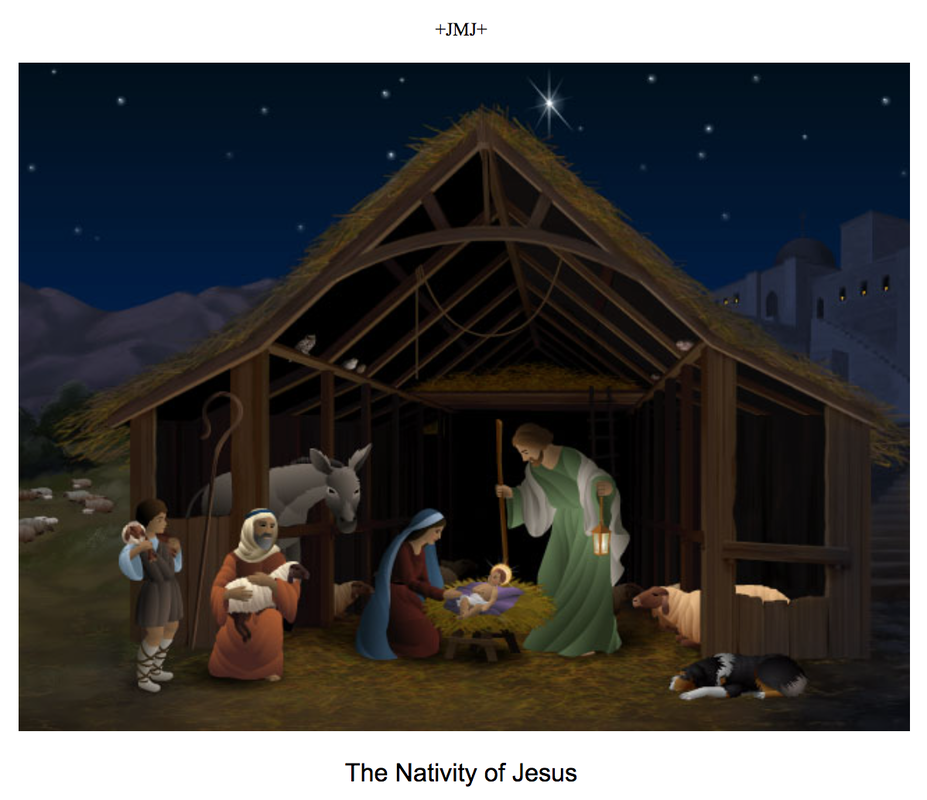
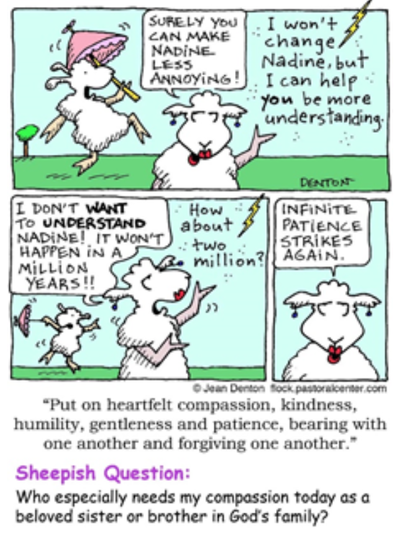

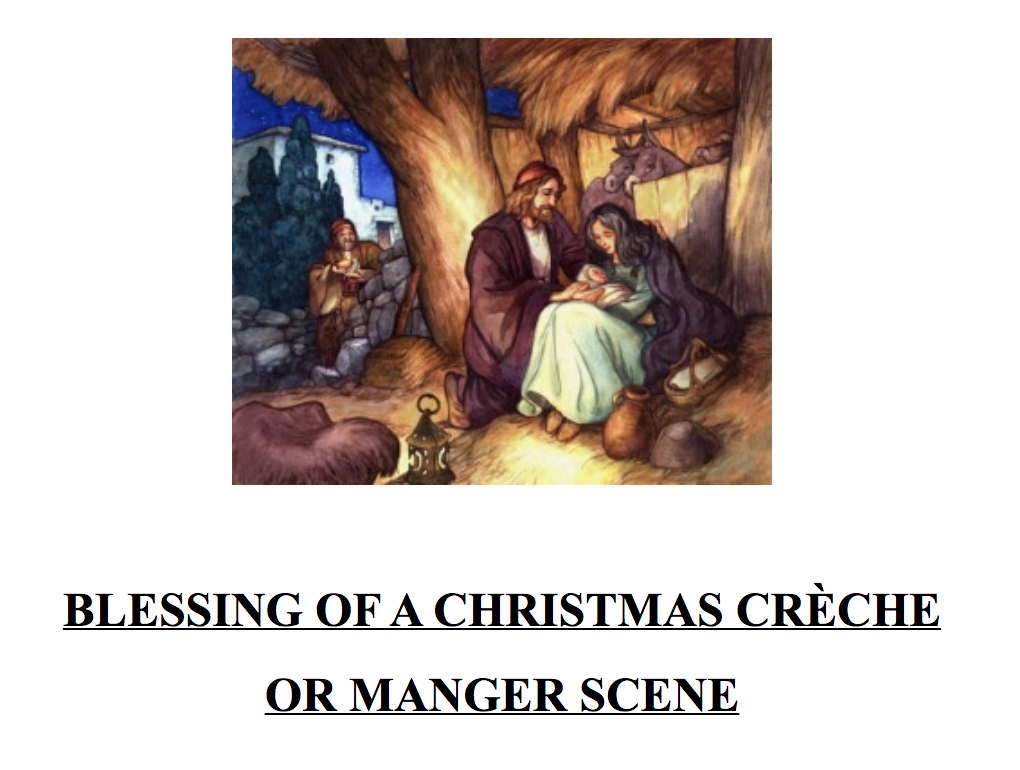

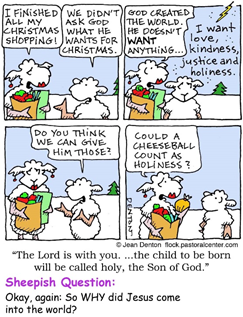
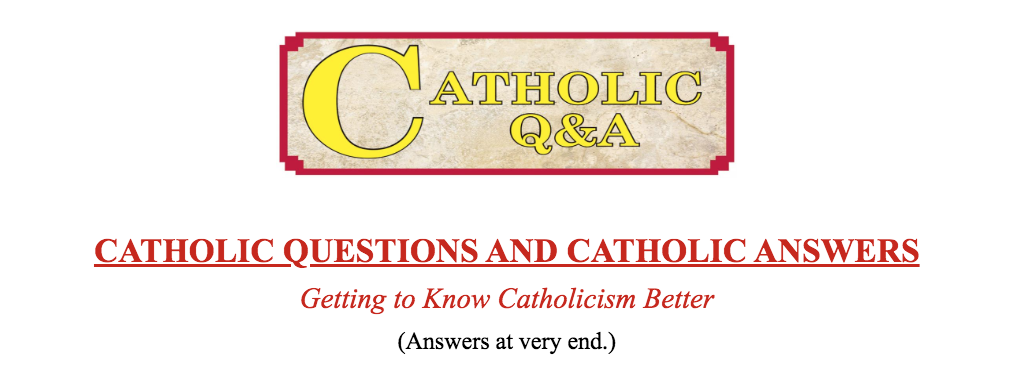
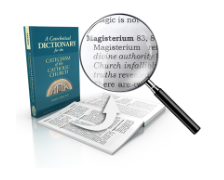
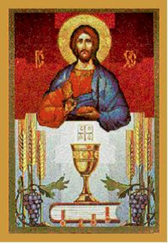

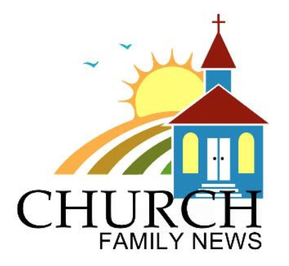





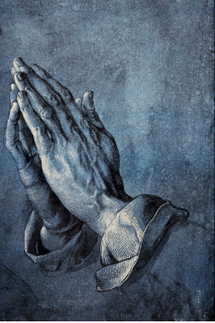

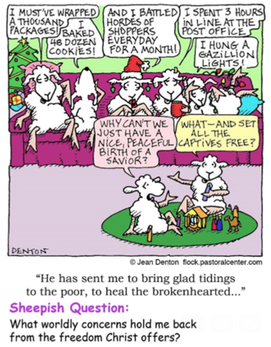

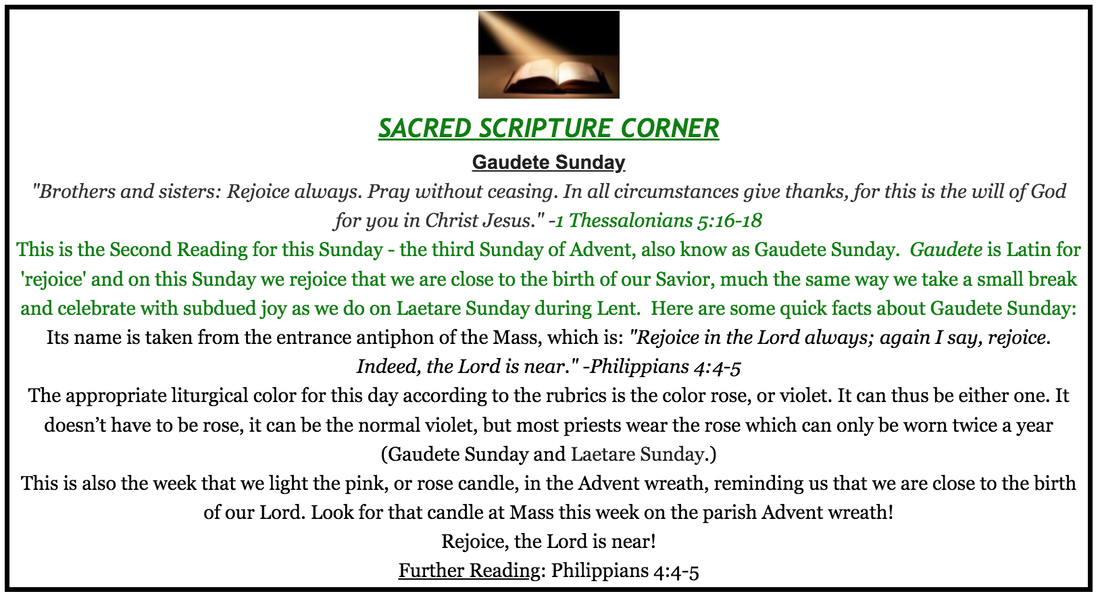
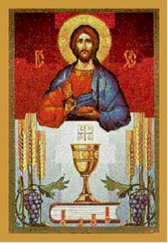



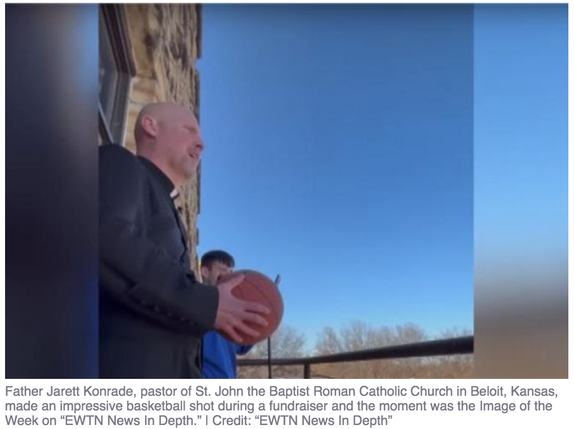


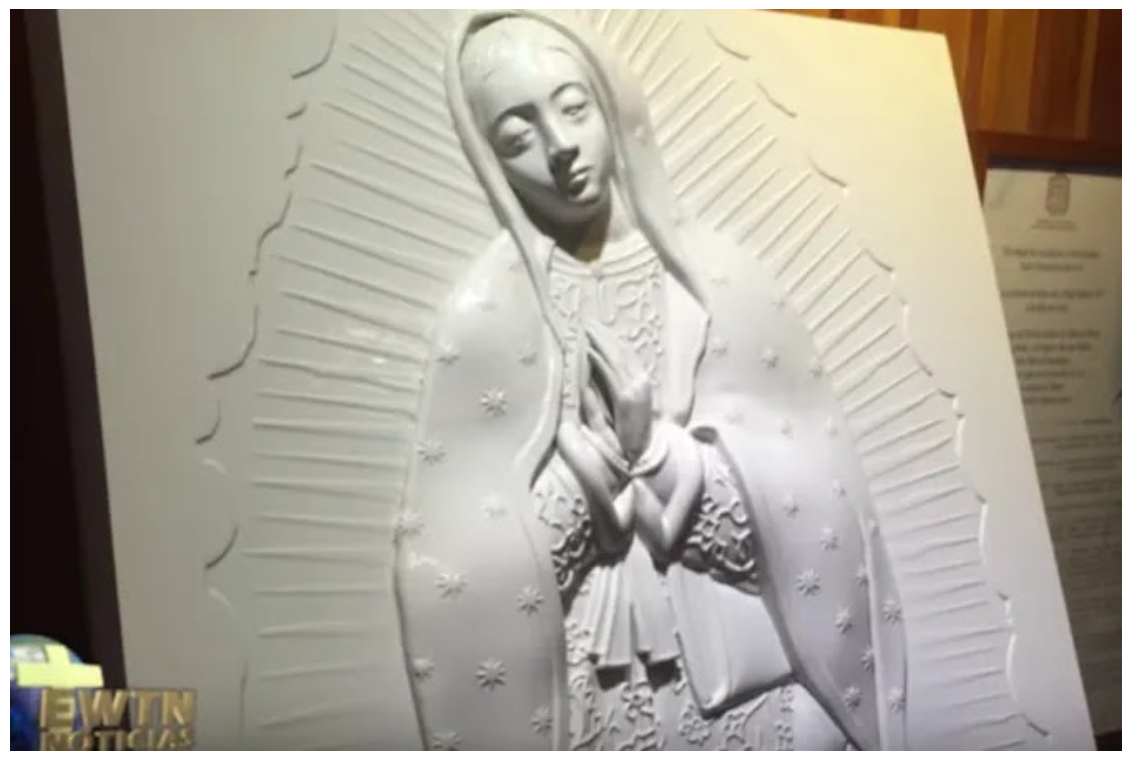
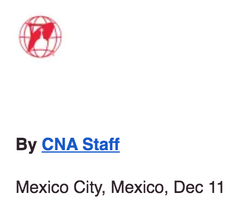

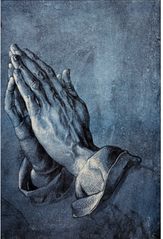
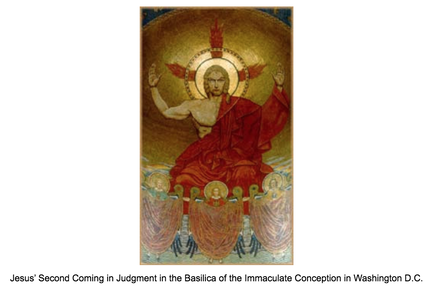
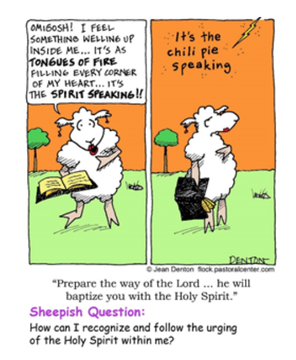

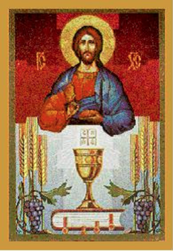
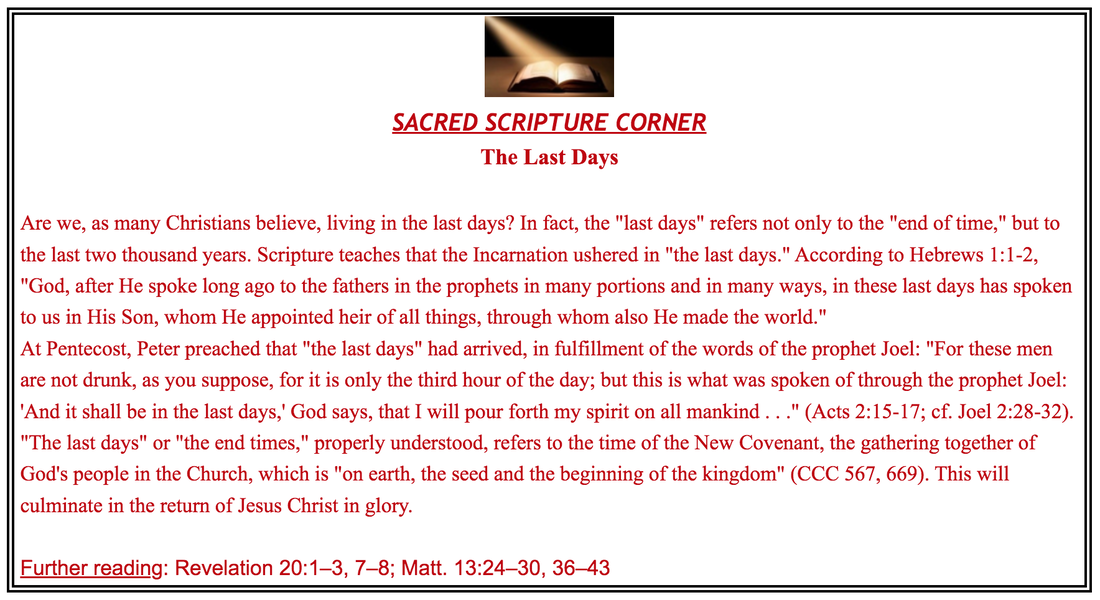

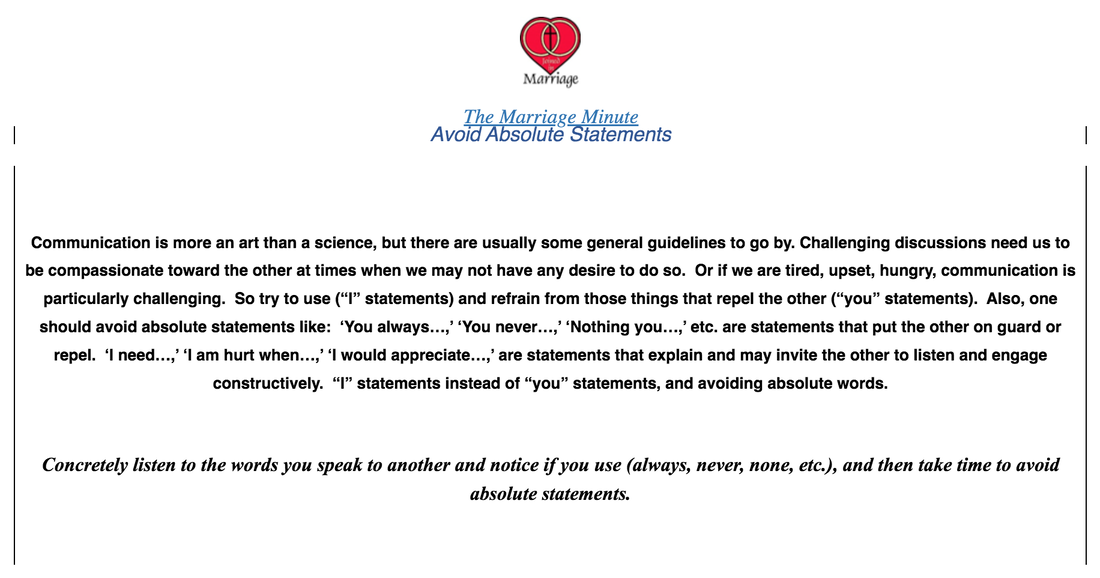

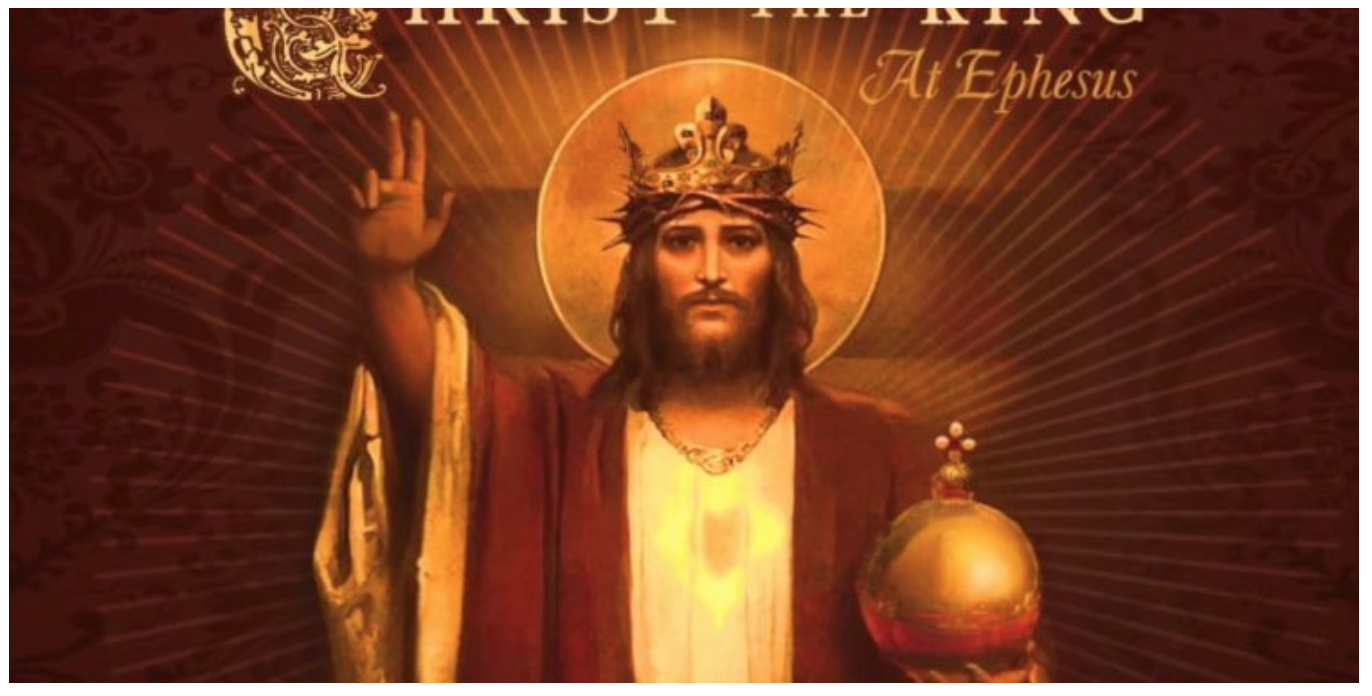
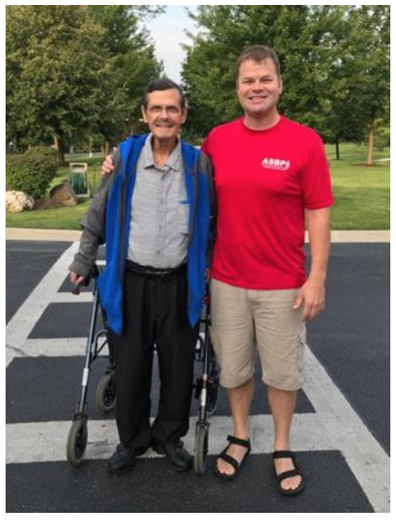

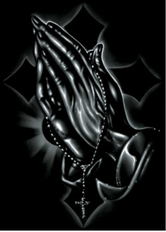
 RSS Feed
RSS Feed
